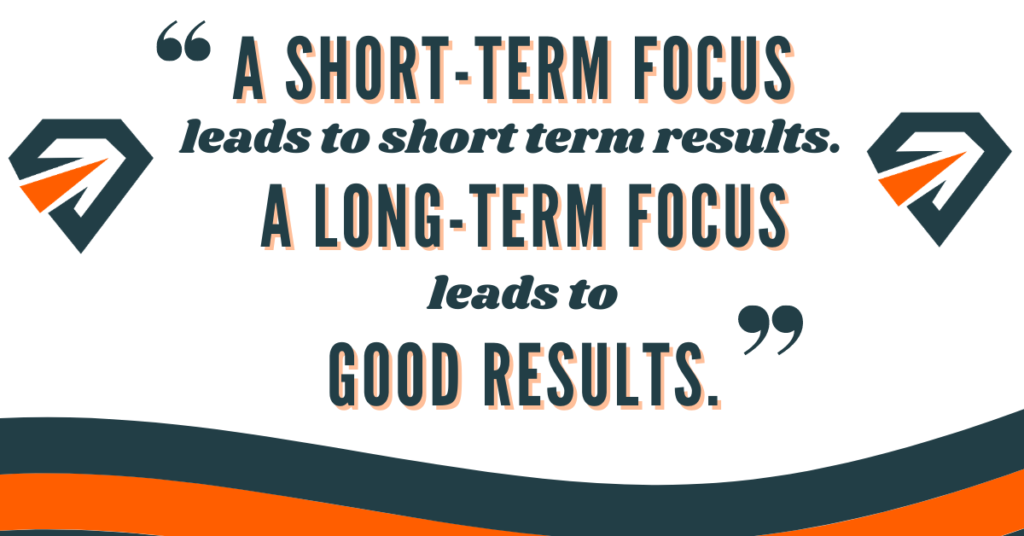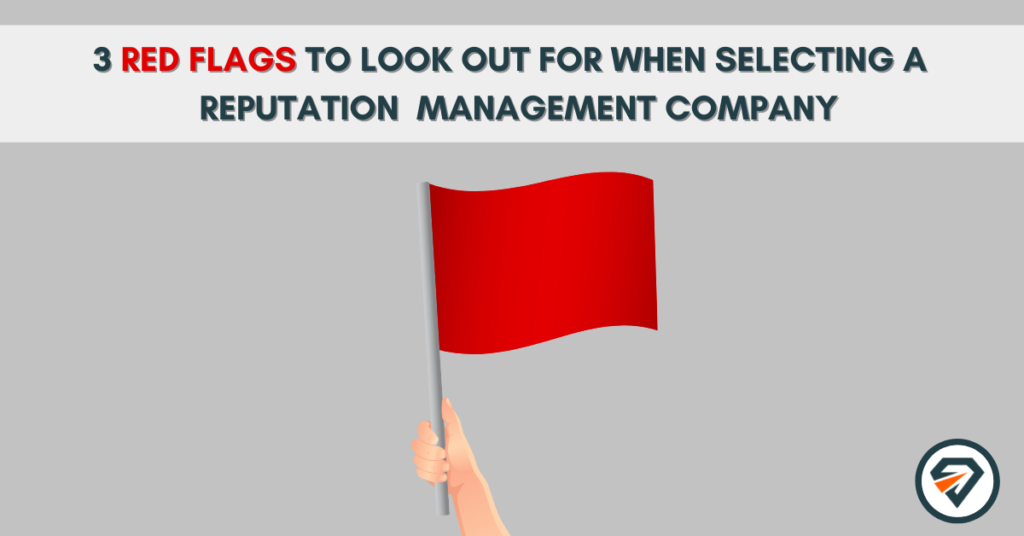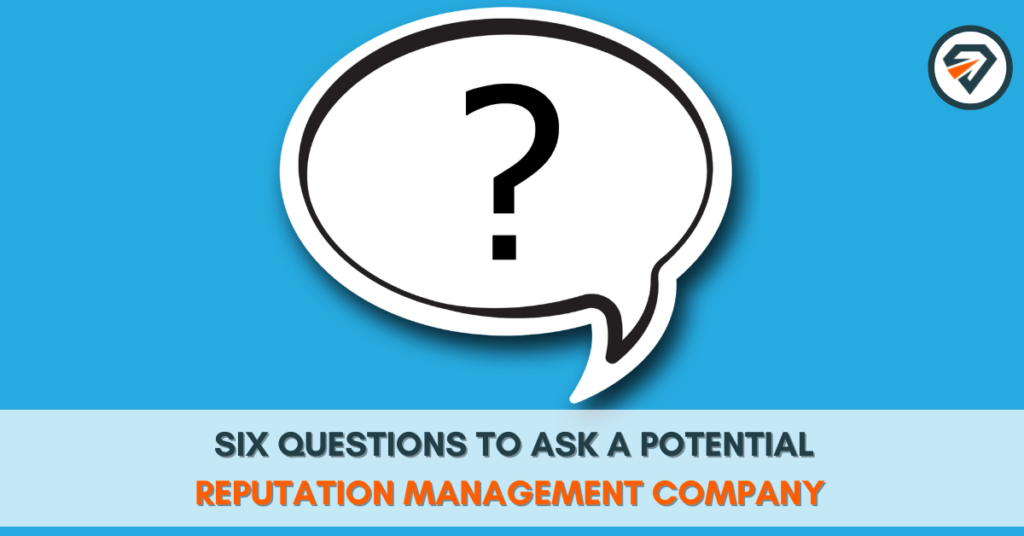Are you confused about the cost of reputation management? Maybe you’ve contacted different reputation management companies, and they’ve told you everything from $500 to $50,000 for the same services. On top of confusing pricing, you may not know what they’re talking about when they explain to you the online reputation management services they provide.
We’re going to review why pricing varies so greatly as well as any red flags to look out for when talking with reputation management companies. We’ll also cover six questions to ask any company you may be considering working with when it comes to your online reputation. These tips will help you know what to expect, when to expect it and what is going to transpire over the course of your ORM trajectory.
Why Does the Cost of Reputation Management Vary?
The best way to explain the varied costs of ORM is to compare your reputation management to your car breaking down. You don’t want it to happen, but sometimes it’s inevitable. When your car breaks down, you have a few options:
- You can take it to a reputable repair shop where the repair is going to be done correctly.
- You can take it to your neighbor who claims to be a car expert. They’ll hopefully get the right part and fix it correctly.
- The last option is for you to pop the hood open to take a look and say, “Let’s see what we can do!”
This is kind of like reputation management. There are professional companies who can take care of ORM for you, identify the problems and quickly get them resolved. There are people who will offer to help that may or may not know about the reputation management industry — maybe they’re in a similar industry, like web design or SEO. And then there are ways that you can try to manage your online reputation yourself.
In order to pick the right path, you need to ask yourself what your reputation is worth to you. Trusting your online reputation to a DIY method or to somebody who is very skilled in an unrelated industry can be asking for trouble. Reputation management is a very particular skill set of online marketing, and if somebody is not focused on that particular skill set, you don’t know where you may end up in the future.
In terms of pricing, you can find companies that will charge you in the low hundreds of dollars for a monthly campaign. There are also companies that will charge you $30,000 to $60,000 dollars per month for the same type of campaign. In addition to that, there are campaigns that will take as short as one month or as long as a year. How do you know how much to spend and how long it should take?
The first thing you should ask yourself is, “Can I spend less?” We all feel that spending less is ideal. Generally, when you spend less (and that is an option) what’s going to happen is your work is going to be outsourced to the lowest bidder. The problem with the lowest bidder is that they’re not focused on getting the results that you’re looking for. The lowest bidder is looking to make the most profit because they’re only working for a couple of hundred dollars, at the most. If you’re paying your reputation management vendor $300 to $500 a month, and they’re outsourcing it for $200 or $300 a month, there’s no margin for anybody to make any money — and there’s no margin for anybody to get results. They hope for the best and they try to get more clients in the door rather than taking care of the clients they already have.
Reputation management has costs. That’s the bottom line. There are all different kinds of costs that are involved in the work. These costs can range from publishing content to writing content. DiamondLinks works with various websites that are all in different industries. For example, we just published an article for a finance professional. His article only costs about $40 to $50 to have written, but to publish it on a specific reputable, high-quality finance website, it cost us over $600.

Costs are important because a short-term focus leads to short-term results. A long-term focus, with good long-term content published on good sites, leads to good results. That’s what DiamondLinks looks for in content. Before creating it, we ask “Why are we doing it? What do we expect to happen?” and, “Can we replicate it to all of our clients?”
But what is it going to cost for reputation management? We’ve worked with the clients that have had three full pages of negatives. Last year, we had a client who had negatives on the Department of Justice website, the FBI’s website, every major newspaper and TV station — all in the first 30 results. His one positive article was his LinkedIn profile. That was a big campaign. Big campaigns tend to need either a long time frame or a big budget.
But most campaigns do not need a long time frame or big budget. Most people have a handful of negatives with a simple goal of getting them pushed down.
To find the cost of ORM, there are a variety of things to consider. At DiamondLinks the first thing for us to consider is how many negative links there are. We need to know where those negatives are ranking and what is the likelihood of us pushing them down quickly with our online reputation management services.
Our goal is to suppress those negatives, take them from the top of the search results and push them down as low as we can. How long will that take? Well, it depends on how strong the negative articles are, and how many of them exist.
Red Flags

Now that we have covered the costs, let’s discuss red flags you should look out for when searching for an online reputation management company.
1. High-priced companies
Is a high-priced option the best? Not always. Sometimes high-priced options are high-priced, just for profit. Sometimes high-priced options are to cover the advertising and marketing costs. If you’ve heard of a particular company on the radio or the company has ads on TV or online, there’s a good chance that you’re paying for those marketing costs. At the end of the day, they have to somehow pay for these advertising spots. It’s not always the case, but when you’re engaged with a high-priced company, it doesn’t mean that you’re getting high-priced, high-quality results.
2. You have no idea what is going on
If you don’t understand very clearly what your reputation management company is telling you, there’s a problem. They should be able to explain to you what they’re going to do — and you should be able to understand it and repeat it back to someone else. A few questions to ask yourself include:
- “Why am I paying for this?”
- “What are the KPIs (key performance indicators)?”
- “Will the company explain what they expect to happen?”
If you can’t answer these questions, that alone should be a major red flag. The company either does not have the experience to tell you what’s going to happen. They’re going to throw some money at your campaign and hope for the best. Hoping for the best is not a strategy.
3. Unachievable Results
Another red flag to watch out for is a company who promises something that is unachievable. Most often we see this in reputation management in one of two ways.
The first is that the company promises to delete an article off a site that cannot actually be deleted. Another promise a company might make is claiming unachievable results that are in an unattainably low timeframe to get something done. A promise of a week, or even a month in most cases, is too short of a time frame to actually get the results you want. You have to factor in the time to write the quality content, to publish the content, as well as the time for Google to index those websites and put them into the algorithm on its own.
Six Questions to Ask Your Reputation Management Company

Finally, I want to offer you six questions to ask your potential reputation management company. If they cannot answer these questions, those are additional red flags and you should run for the hills.
Question #1: How do you fix a bad reputation online?
The company you are talking with should be able to clearly and accurately tell you step by step what will happen with your campaign by the end of the conversation. If you don’t understand what’s happening, you should not be paying for their services. Reputation management is not a secret sauce. There is not a special mathematical algorithm that we have — we don’t have secret formulas. It’s about good content, being placed on good sites, that leads to good long-term results. Couple that with effective link building and you have a reputation management strategy.
Question #2: What are the definable steps that you will take?
Ask what is step one, two and three to clean up your search results. If someone is telling you that there are proprietary methods and there are secret things that they can’t divulge, they’re probably hiding something.
Question #3: What are the key performance indicators?
Ask what are the key performance indicators (KPIs) that your ORM company will use to measure the effectiveness of your campaign. If there are no KPIs, if there is no way to accurately measure the results, what are you paying for? At DiamondLinks, the most important metric is tracking where the negative link is ranking. Those are results to us and the most important performance metric that we can possibly offer.
Question #4: Do you have a case study?
You want to know about previous work the company has done to know if they are qualified. Is there something that they can show you that proves the effectiveness of their strategy on another client? At DiamondLinks, we typically work with 30 to 60 clients in an average month. We can show you other clients like you, clients in other industries, as well as their ranking reports, graphs and other information (that will have the client name removed for their own privacy.)
Question #5: Do you have a usual process for working with a new client?
This means asking what you, as a brand new client, can expect. What are the deliverables? How will the company communicate with you, and how often? Will you be working with someone overseas who will be your point of contact, or someone in the corporate office? You should know what to expect on a daily, weekly or monthly basis in terms of a communication process.
Question #6: How long will my campaign take, and what does it cost?
It all comes down to the ultimate cost over a span of time. “What can I expect to spend to accomplish these results?” If the company can’t tell you a fairly accurate explanation of how long they expect your campaign to take and what you can expect in terms of costs, that’s a red flag. You should know upfront what you’ll be paying within a small margin and have a decently understanding of how long your work will take.
If your reputation management vendor cannot answer these questions, that’s a problem you need to address before you sign a contract. Knowing these answers will help you understand what to expect, and it’ll help the company know that you anticipate real results from them.
DiamondLinks does all of these things. I’ve been in this industry for over 15 years helping people like you understand what reputation management is. We’re happy to talk through any of the above with you. If you just want to discuss a quote you’ve received from another company — even if you never become a customer, we’re happy to help. Contact us today!
Have a question for DiamondLinks? We’ve got answers! Submit your question today. You could be featured in the next episode of Ask DiamondLinks!
Don’t forget to subscribe to us on Youtube and sign up to receive our newsletter for all the latest SEO and ORM news.

